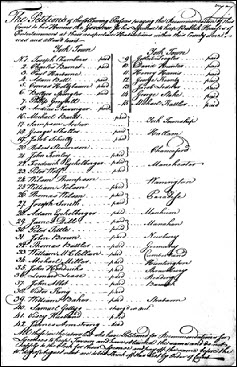Licenses, 1762 style
There are 42 names on the list in the records of the Court of General Quarter Sessions of the Peace held at York for the County of York the last Tuesday of July 1762.
Every one of them is set out in full, with first name, last name and even, in most cases, the town or city of residence:
• From the City of York: Joseph Chambers; Charles Barnet; Paul Harborne; Adam Bott; Conrad Woltzbaum, Balzer Spengler, Philip Greybill, Andrew Navinger, Gottlieb Teegler, David Hunter, Henry Harris, George Koontz, Jacob Ledder, George DStake and Michael Kattler.

• From York Township: Michael Bardt and Sampson Archer.
• From Hallam: George Shaller and Jacob Schultz.
• From Chanceford: Robert Stevenson and John Finley.
• From Manchester, Frederick Eychelberger and Peter Wolf.
• From Warrington, Wilson Thompson and William Nelson.
• From Paradise, Thomas Wilson and Joseph Smith.
• From Manheim, Adam Eychelberger.
• From Manahan, James Dill and Peter Tittle.
• From Newburg, John Brown.
• From Cumberland, William McClellan.
• From Huntington, Michael Miller.
• From Shrewbuyry, John Hendricks.
• From Reading, Leonard Lease.
• From Barwick, John Abbot.
• From Strabann, William Baker.
• And four without a town or city: Victor King, Samuel Gettys, Visey Husband and James Armstrong.1
And there’s one more piece of information about each of these individuals: from this one piece of paper, written on one day, in one court record, we know exactly what each of these men did for a living.
Each of them was a tavernkeeper.
Pennsylvania had long regulated liquor and liquor sales. One of the very first laws passed in 1682 was a law against drunkenness,2 and by 1700, the laws provided that “no person … shall hereafter have or keep any public inn, tavern, alehouse, victualling house or other public house of entertainment, unless such person … shall first have license for the same from the proprietary and governor…”3 By 1711, the law provided that anyone wanting to keep such an establishment had to be “first recommended by the justices in the respective county courts … in their quarter-sessions…” and pay a licensing fee.4 And by 1721, each of the tavernkeepers had to enter into bond to “at all times be of good behavior, and observe all laws and ordinances … relating to innkeepers or taverners…”5
And so the men of York County — and their counterparts all over Pennsylvania — went to their local courts to get approval to keep their taverns. And, on the pages following, many of these men and least one other as surety were recorded as giving bond for their good behavior as tavern keepers.6
We find out, in these pages, who on the list paid the fee for the license. Who didn’t (Paul Harborne; Philip Greybill, Sampson Archer, Robert Stevenson, and Wilson Thompson didn’t have paid written after their names). One — Samuel Gettys — was recorded as “charged in acct.” And one, James Armstrong, ominously, was recorded as “dead.”
A full 28 years before the first census.
Decades before occupations were first recorded in the census.
Forty-two names in a court record. With residence towns, and an occupation.
And you thought court records were boring…
SOURCES
- York County, Pennsylvania, Court of Quarter Sessions, Docket Book 7:77 (July 1762); digital images, “Dockets, 1749-1794,” FamilySearch (https://familysearch.org : accessed 30 Oct 2017), citing Pennsylvania Historical & Museum Commission, microfilm. ↩
- Chapter 12, Laws of 1682, 1 Pennsylvania Statutes at Large: 33; digital images, Pennsylvania Legislative Reference Bureau (http://www.palrb.us/default.php : accessed 30 Oct 2017). ↩
- Chapter 77, Laws of 1700, 2 Pennsylvania Statutes at Large: 93. ↩
- Chapter 172, Laws of 1710-1711, 2 Pennsylvania Statutes at Large: 358. ↩
- Chapter 244, Laws of 1721, 2 Pennsylvania Statutes at Large: 249. ↩
- York County, Pa., Court of Quarter Sessions, Docket Book 7:78-80 (July 1762). ↩



That John Hendricks in Shrewsbury may well be a connection of mine. My Hendricks/Hendrix like was in Penn. starting in 1662 and many had moved on by 1762, but there certainly may have been others who had not. There are records of earlier Hendricks/Hendrix men who owned taverns.
“line,” not “like!”
Thank you for posting this. John Abbott is my 6th gg.
Leonard Lease is my 6 gg. His actually last name I believe was Lascht. How can I find out the name and location of his tavern?
Getting the court records, bonds and tax records would be a good place to start.
Thanks